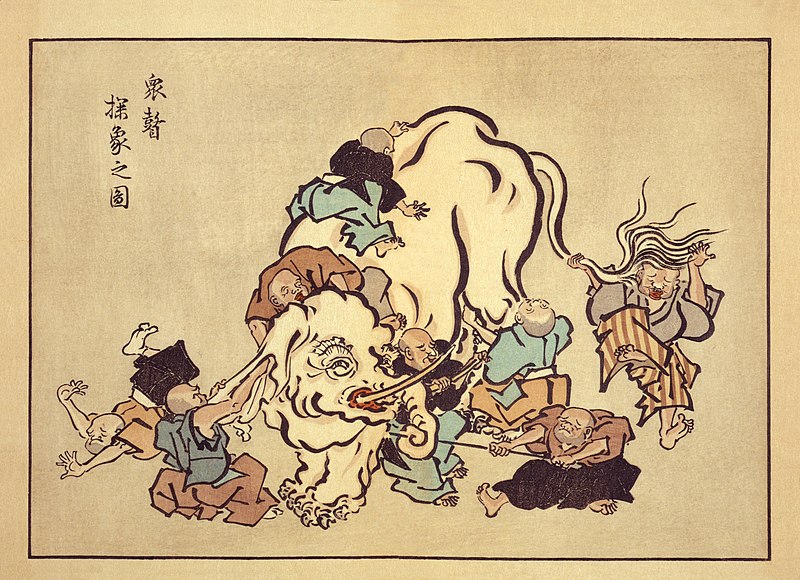Human development "is a very messy affair" (Wilber, 2000, p. 7) that may not be sorted out by staring through a single lens. As new lenses emerge, the competing perspectives in the academic and scientific community seem no different from the quarrels over philosophy and religion that seem to have been a fundamental part of the human equation throughout history. Arguably, the academic and scientific communities seem to be attempting to answer the same questions that have plagued humans throughout history, excitedly publishing "discoveries" of insights that have been known for centuries in religion, philosophy, and common sense.
Methodological myopia
Attempting to understand reality through a single lens causes a myopia equivalent to the blind men and the elephant that various religions and philosophies use to demonstrate the importance of a prophet or how different people perceive reality differently depending on their perspectives. In the parable of the Blind Men in the elephant, six blind men feel different parts of the elephant, then explain what they think the elephant is.
- The blind man holding the trunk says the elephant is like a snake.
- The blind man grasping the tail says the elephant is like is a rope.
- The blind man holding his palms against the side says the elephant is like a house.
- The blind man stroking the ear says the elephant is like a fan.
- The blind man touching the tusk says the elephant is like a spear.
All are correct in their analogies, but mostly incorrect in their interpretation of what an elephant is. Even if they are able to stop their quarrel to combine the limited perspectives they do not understand the nature of the elephant. As the map is not the territory, the analogy is not the reality.
The moral of the story in the Buddhist version of the tale provides an apt editorial to consider when viewing the world through the disparate perspectives of human development (Udana: 68-69):
O how they cling and wrangle, some who claim
For preacher and monk the honored name!
For, quarreling, each to his view they cling.
Such folk see only one side of a thing.
Paraphrasing the moral of the story as interpreted by 19th Century poet John Godfrey Sacks, viewing the world through a myopic lens can cause people to "rail on in utter ignorance" about something they have not really seen. Given human nature and the disparate lenses of developmental psychology, even if a person with sight came upon the quarreling blind men, they would likely neither listen nor believe. Individuals tend to only perceive the world through myopic lenses, losing any opportunity to understand reality. Then again, even the sighted may only understand what they see as an elephant while failing to understand the true nature of the elephant.
Methodological integration
A comprehensive model of human development would attempt to find reality and truth, not be limited by a philosophical lens. Integral psychology purports to consider the best each philosophy offers in an attempt to discover reality (Wilber, 2000). Granted, concepts like reality may be heretical to contextualists, who condemn the universal as an illusion constructed by western society (Goldhaber, 2002.
Ken Wilber (2000), a leading proponent of integral psychology asserts that contextualists bash anything universal, except "for their own universal pronouncements in the importance of [their philosophy]." Wilber proposes "strict evidence" of similarities among the world's wisdom traditions. Just as "the human body everywhere grows 206 bones, two kidneys, and one heart, and the human mind everywhere grows the capacities for images, symbols, and concepts, the human spirit everywhere grows intuitions of the Divine" (pp. 16-17). With a vision that sees that "We are all the sons and daughters of a Godhead" (p. 190), the integral perspective holds high aspirations for the potential of human development. However, while inclusive, integral psychology might be just another philosophical lens.
All of the above
In peering at the human through the metaphors that represent the major philosophical lenses of developmental psychology this section explored whether the human is a machine, an organism, or a context. The answer can be a resounding "all of the above".
- As far as people passively react to internal and external forces, they are mechanical.
- As far as people actively make choices about how they will react to and control the internal and external forces of their lives to progress toward inherent potential, they are organismic.
- As far as events and time shape people, they are products of their context.
Even though adherents to a particular lens may conclude that they are all mutually exclusive, each lens seems to provide the objective viewer with insights that can lead to a better understanding of human development.
###


